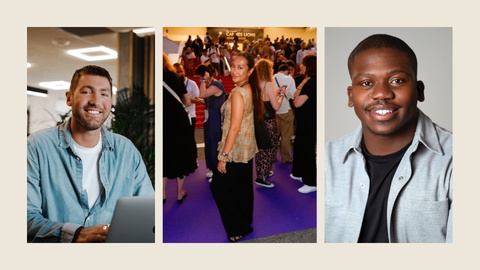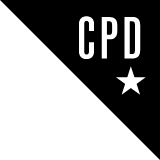Forget screens, gen Z wants to network in person. Will senior PRs help them?
Networking has always been viewed as essential for PRs. But many younger professionals are finding it difficult thanks to a preference for digital mingling and underdeveloped soft skills.
After five fallow years in which Covid, hybrid working and a squeeze on budgets threatened to kill it off, in-person networking is staging a comeback. Last year, the number of corporate events held in the UK rose by 12% from 2023, according to the UK Conference and Meeting Survey 2025.
While many PR and comms professionals might be busy dusting off their elevator pitches or bracing themselves for another evening of chablis and canapes, there’s one group of PR workers who are less keen: those younger entrants who grew up online, started their jobs dialling in on Zoom and haven’t got the cash to go out. Face-to-face networking might be back, but a growing number of younger PRs today are finding they don’t know how to do it…
Today, when 40% of gen Z are more comfortable communicating online than in person (according to 2025 data from market research agency OnePoll.com), many younger recruits have told Influence they don’t know how to approach clients, make office small talk or sustain conversations.
Some of this mirrors social trends – gen Z are not only spending less time socialising than previous generations (one in three younger Britons is going out less according to nightclub operator Rekom) but have grown up with higher levels of social anxiety too (anxiety referrals for children in England soared from 98,953 in 2019-2020 to 204,526 in 2023-24). Meanwhile, in a world where 90% of gen Z-ers are nervous about speaking on the phone, perhaps it isn’t surprising they’re currently struggling to nurture professional relationships.
Where does this leave networking, typically viewed as the lifeblood of the industry? At its heart, PR is about building confidence and trust – and relationships among journalists, influencers and clients. A well-crafted press release always helps, but a trusted IRL relationship with a familiar face often determines whether your story is picked up by media outlets deluged with similar pitches.

Networking also helps develop soft skills such as empathy, active listening, persuasion/influencing and conflict resolution – all of which are forecast to be needed in an industry where 40% of tasks performed by PR professionals are now assisted by AI tools (CIPR). Then there’s career progression. If digital natives continue to shun physical networking, many risk becoming ‘invisible’, hindering career mobility.
And yet… the appetite to attend face-to-face events is there. A recent Bupa survey found 45% of gen Z respondents were looking for jobs with more social interaction, largely because they’re feeling lonely (38% feel socially isolated because of work circumstances). At the same time, they’re spearheading new forms of online networking, where LinkedIn QR codes and webinar chat functions are replacing paper business cards and catching up over the phone. This new networking could be a boon for introverts who feel squeamish about approaching strangers, or flexible workers who can’t always make that 8am breakfast meeting or spend every week-night chin-wagging with journalists.
Does all this mean face-to-face networking risks becoming extinct? Or should we all embrace the new (networking) normal. We spoke to PRs – junior and senior alike – to find out…
Networking according to gen Z and millennials
“It can be daunting when you’re the youngest person in the room… I’ve seen younger PRs stuttering and speaking with shaky voices or spending the events staying at the edge of the room. I think the lack of interaction during Covid really impacted the way we approach our professional relationships.”
Leticia Callista, 25, account executive, Curzon PR
“When it comes to networking events, I often find myself riddled with nerves and anxiety. Even though by the end of every event, I always think, ‘That was such a great experience and so nice to meet everyone”, that initial wave of anxiety hits me like clockwork every single time before walking into an event.”
Ollie Manser, 30, PR manager, the MTM Agency
“Many young people are fearful about going to networking events because they think they’ll run out of things to say. I think some networking workshops or [coping] strategies could really be effective in tackling that.”
Tariq Peters, 31, personal branding coach

“We all want to network as we heard how important it would be for our careers. But we don’t know what to do! Do you just go up to somebody? And if you approach somebody, what do you talk about?”
PR assistant, 27, London
“Sometimes I go around [at events] thinking I have little to offer as a junior professional. That’s obviously not the right mindset, because everyone has something to learn from each other. But it does make it difficult to approach new people.”
Leticia Callista
“How do I network in an office? I’m just there to get my work done. Usually, I just put my headphones in and get on with it…”
PR account assistant, 23, Ipswich
“It’s cringe going up to a stranger.”
Communications assistant, 25, Cardiff
“Why do younger PRs prefer networking digitally? It’s because there’s a sense of protection. It allows you to think about your responses, which you can’t with face-to-face interactions. Because we’re used to planning what we’re going to say, it sometimes means we’re a lot quieter because we fear saying the wrong thing. It’s also difficult because we’re more tied up in deliverables than senior members – we’re justifying the need for networking with the urgency of having to deliver our KPIs.”
Leticia Callista
“With hybrid working, we have far fewer face-to-face interactions than before, so networking can feel unfamiliar or intimidating.”
Ollie Manser

Networking according to senior PR professionals
“Part of the problem now is that there are fewer opportunities for face-to-face networking. The professional events that do take place often require travel, time and expense – all this can be avoided by taking advantage of online attendance. Yes, there is online networking but looking at LinkedIn, many comments are now made to establish personal presence in a network, rather than for real value.”
Jon White, chartered PR professional and honorary CIPR fellow
“Our business is all about relationships. We’re only as good as our little black books. On the agency side, clients rely on us being ‘out there’ with an ear to the ground on trends. That’s why it’s important for us to make interesting connections and introductions on their behalf.
“The pandemic dented the confidence of many people, preventing many from learning how to network. The ability to operate in a social business situation you don’t know is an essential life skill. Love it or hate it, networking is central to meeting new people. Plus, you never know where it might lead.
We have some fantastic, ambitious colleagues starting out in this industry who are raring to get out there. Whether it’s encouraging them to catch up with peers or working the room at events, it’s up to us [as PRs] to empower them to do it… Sitting on your sofa is so 2020!”
Niki Wheeler, director, Team Lewis
Gen Z are networking, but they’re doing it differently
How senior pros can benefit from some of the new tech, tactics and techniques used by younger colleagues
LinkedIn QR codes… are the new business cards
Spending an event stockpiling business cards (before spending ages painstakingly putting them into a Rolodex) rightly seems an archaic custom for many Gen-Zers. In its place is the LinkedIn QR code, which can be saved as an image to a phone, before letting new contacts scan it at events.
Webinar chat functions… are the new post-panel mingle / sidling up to the editor at a buffet
“If I’m attending a webinar, I go into the chat function and see who else is in the group. I’ll then use that to share my LinkedIn and see whether there’s anybody else interested in connecting.”
Tariq Peters
DM-ing a journalist on LinkedIn or Instagram… is the new cold call
“If you’ve worked with a journalist on a story, connect with them afterwards, engage with their posts and keep the relationship warm. That way if you have another story idea that fits their outlet, they’ll be more inclined to remember you… It’s great for fostering long-term relationships and building genuine friendships.”
Ollie Manser
How to support younger PRs with networking
Training and toolkits in soft skills such as small talk.
In the accounting sector, big four firms such as Deloitte and PwC have offered younger hires training on skills neglected during the pandemic, such as face-to-face conversations and handling physical meetings.
Manser thinks PR and comms needs the same. “The focus should be small talk and keeping a conversation flowing. It might sound silly to train someone in ‘how to talk’, but when you’re in that situation – nervous and with a blank mind – it can make a huge difference, especially to younger PRs who lack the confidence to walk into a room and start a conversation.”
“The emphasis should be on helping younger professionals build their emotional intelligence,” adds Callista, who suggests practical toolkits and guides on topics such as starting conversations.
Make the networking scene less London-centric
“Many people don’t attend events because they’re simply too far away or expensive. Hosting events across the UK would open them up to more people. Also, if agencies covered travel expenses, it’d make a big difference.”
Ollie Manser
Make events less boozy and more experiential
With gen Z drinking less, maybe it’s time to ditch the boozy shindigs and let them organise their own events based around experiences, such as running clubs or reading groups. “Organising a board games night for example, might be good for PRs uncomfortable with drinking alcohol,” says Peters. One potential model is networking programme Wharf Connect which has hosted quizzes and Taiwanese bao-making classes for professionals in their first 10 years of their career working in London’s Canary Wharf.
Let younger PRs organise their own events
“Many events tend to be hierarchical. Allowing younger professionals to organise their own events would make it feel more relevant to us. That level of ownerships – plus networking with peers our own age and level of superiority – would automatically translate to more confidence.”
Leticia Callista

Organise multi-department socials
PRs working for in-house agencies can often feel disconnected from other parts of the organisation. It’s even worse for younger recruits. Hosting multi-department functions can help people develop their networking skills in a ‘safe’ environment.
Sharing event guest lists
“Knowing who’s going to be in the room by circulating attendee lists a few days before the event would be useful. I imagine many events have high drop-out rates, so if you can demonstrate that it’d be worth people’s time attending, then you’re likely to see fewer no-shows.”
Valentina Kristensen, corporate affairs director, OakNorth
Demonstrate how networking can boost careers
“PRs need to showcase the benefits of networking with their colleagues. It’s about getting younger people to understand networking isn’t about immediate gratification, but an asset that could propel their careers. Not every contact will be relevant to your career right now, but some might be later.”
Tariq Peters
- The CIPR Leadership & Impact Conference on 13 November is not only packed with insightful speakers but also a fantastic place for present and future leaders to build their confidence and to network. Find out more.

Christian Koch is an award-winning journalist, editor, content strategist and brand consultant.
Recommended reading
10 ways PRs should be using LinkedIn now the algorithm has changed
What to wear to work now: The shifting codes of workwear
Ed Zitron on whether AI will blow like the sub-prime mortgage scandal


